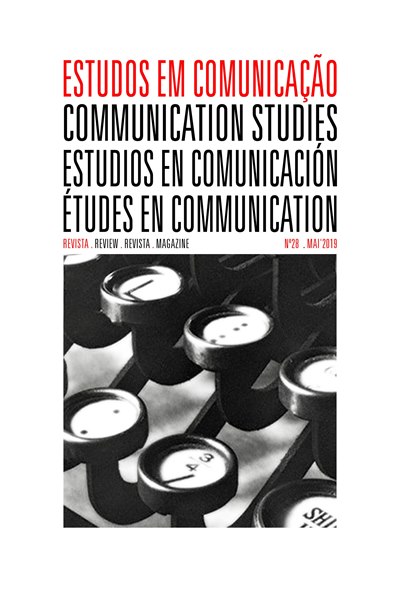Leitorado Casual, Eleitorado Habitual: mudanças no ecossistema da informação e suas relações com o comportamento eleitoral das massas
Keywords:
political communication, journalism and politics, tabloidization, Brazil, electionsAbstract
This paper contributes to a research agenda that has sought to explore the processes of politicaleconomic reconfiguration that Brazilian printed press has been going through in recent years. If, in previous stages, we have demonstrated how many printed titles work in different symbolic capital markets, and how, from this multifaceted performance, it is possible to relativize the understanding that there is a crisis in the contemporary press, this time we try to relate the changes in the economic landscape of journalism to the political process itself. We will do this through three distinct moments: firstly, from a systematic observation about Rio de Janeiro’s printed newspaper market, establishing the bases for understanding this new political-economic scenario of the press and characterizing the rise of popular genres; then, deepening the peculiarities of the Brazilian tabloid model and highlighting the effects of this crisis scenario for the national prestige press; and, finally, establishing relationships between the socioeconomic profile, the political preferences of the readers of newspapers and their reading habits, also trying to evaluate the political coverage of the popular newspapers in direct comparison with the socalled quality papers.
References
(2014). Aumento da escolaridade do brasileiro começa a mudar perfil do eleitor. Agência Brasil. Disponível em: http://agenciabrasil.ebc.com.br/politica/noticia/2014-08/aumento-da-escolaridade-do-brasileiro-comeca-a-mudar-perfil-do-eleitor. Acesso em: 11/04/2018.
(2014). Datafolha traça perfil do eleitorado brasileiro. Jornal do Brasil. Disponível em: www.jb.com.br/eleicoes-2014/noticias/2014/09/22/datafolha-traca-perfil-do-eleitorado-brasileiro/. Acesso em: 11/04/2015.
Bird, S. (2009). Tabloidization: what is it, and does it really matter?. In B. Zelizer (ed.), The changing faces of journalism: tabloidization, technology and truthiness. Londres e Nova Iorque: Routledge.
Capella, J. & Jamieson, K. (1997). Spyral of cynicism: the press and the public good. Nova Iorque: Oxford University Press.
Carvalho, F. (2017). Dilma e Aécio nos portais de Veja e CartaCapital em 2014: uma comparação entre editorias jornalísticas e blogs na cobertura das eleições presidenciais. Revista Compolítica, 7(2).
Chagas, V. (2014). Papel de embrulhar peixe: uma análise sobre o modelo econômico de distribuição dos jornais e seus prognósticos. Contemporânea, 12(1).
Chagas, V. (2017). Uma alternativa para escapar à tabloidização ou uma forma de tabloidização alternativa? O mercado brasileiro de jornais populares e a economia política da imprensa escrita. Revista Brasileira de Ciência Política, 22.
Faustino, P. (2004). A imprensa em Portugal: transformações e tendências. Lisboa: MediaXXI.
Fiske, J. (1992). Popularity and the politics of information. In P. Dahlgren & C. Sparks (eds.), Journalism and popular culture. Londres: Sage.
Fiske, J. (2010[1989]). Understanding popular culture. Londres e Nova Iorque: Routledge.
Fontenelle, A. & Guazina, L. (2016.) O uso de pesquisas eleitorais no colunismo político: uma comparação entre O Globo e La Nación nas eleições presidenciais de Brasil (2014) e Argentina (2015). Revista Compolítica, 6(1).
Gans, H. (2009). Can popularization help the news media?. In B. Zelizer (ed.), The changing faces of journalism: tabloidization, technology and truthiness. Londres e Nova Iorque: Routledge.
Gripsrud, J. (2000). Tabloidization, popular journalism, and democracy. In C. Sparks & J. Tulloch, Tabloid tales. Nova Iorque: Rowman & Littlefield.
Guazina, L. & Santos, E. (2017). O impeachment de Dilma Rousseff nas capas da Folha de S. Paulo. Anais do 41º Encontro Anual da Anpocs. Brasil, Caxambu, Minas Gerais: Anpocs. Hall, S. (2003). Da diáspora. Belo Horizonte: EdUFMG.
Klein, U. (2000). Tabloidized political coverage in the German Bild-Zeitung. In C. Sparks & J. Tulloch, Tabloid tales. Nova Iorque: Rowman & Littlefield.
Lacy, S. (1991). Effects of group ownership on daily newspaper content. Journal of Media Economics, 4(1).
Lattman-Weltman, F. (2015). Democracia e revolução tecnológica em tempos de cólera: influência política midiática e radicalização militante. Anais do VI Encontro Compolítica. Brasil, Rio de Janeiro: PUC-Rio/Compolítica.
Lattman-Weltman, F. & Chagas, V. (2017). Insegurança, (re)partidarização e “fogo amigo”: a economia política dos meios na Era Lula. Revista Eptic, 19(2).
Lattman-Weltman, F. & Chagas, V. (2016). Mercado Futuro: a economia política da (re)partidarização da imprensa no Brasil. Revista Dados, 59(2).
Maia, R. (2007). Redes cívicas e internet: efeitos democráticos do associativismo. Logos, 27(2).
Maia, R. (2012). Deliberation, the media and political talk. Nova Iorque: Hampton Press.
McGuire, J. & Reeves, G. (2003) The Bharatiya Janata Party, Ayodhya, and the Rise of Populist Politics in India. In G. Mazzoleni et al, The Media and Neo-Populism. Westport: Praeger.
Park, C. (2014). Media cross-ownership and threat to diversity: a discourse analysis of news coverage on the permission for cross-ownership between broadcasters and newspapers in South Korea. International Journal of Media & Cultural Politics, 10(1).
Prior, H.; Guazina, L. & Araújo, B. (eds.) (2016). Diálogos lusófonos em Comunicação e Política. Covilhã: LabCom Books.
Sant’Anna, L. (2014). Perfil do eleitor: continuidade ou mudança? Disponível em: http://politica.estadao.com.br/noticias/eleicoes,perfil-do-eleitor-continuidade-ou-mudanca,1507476-cap1. Acesso em: 11/04/2015.
Serazio, M. (2009). Rethinking a villain, redeeming a format: the crisis and cure in tabloidization. In B. Zelizer (ed.), The changing faces of journalism: tabloidization, technology and truthiness. Londres e Nova Iorque: Routledge.
Soares, A. A. (2015). Nova classe média: um estudo empírico sobre os enquadramentos da mídia. Dissertação de Mestrado, Rio de Janeiro, PPHPBC/FGV.
Sparks, C. (2000). Popular journalism: theories and practice. In C. Sparks & J. Tulloch, Tabloid tales. Nova Iorque: Rowman & Littlefield.
Sparks, C. (2000). Introduction: The panic over tabloid news. In C. Sparks & J. Tulloch, Tabloid tales. Nova Iorque: Rowman & Littlefield.
Downloads
Published
Issue
Section
License
Estudos em Comunicação/Communication Studies is an Open Access journal. All its content is freely available without charge to the user or his institution. Users are allowed to read, download, copy, distribute, print, search, or link to the full texts of the articles in this journal without asking prior permission from the publisher or the author. Estudos em Comunicação, by Labcom, is licensed under a Creative Commons Atribuição-NãoComercial-SemDerivações 3.0 Unported License. By submitting your work to Estudos em Comunicação/Communication studies you confirm you are the author and own the copyright, that the content is original and previously unpublished, and that you agree to the licensing terms.


